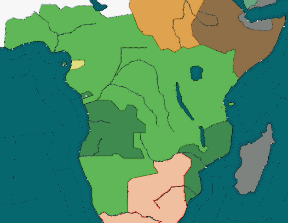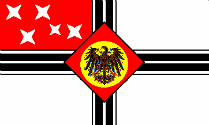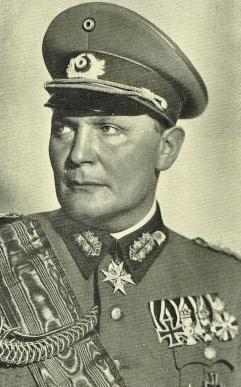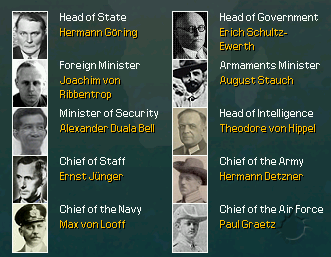Mittelafrika
From Kaiserreich
MaskedPickle (Talk | contribs) |
MaskedPickle (Talk | contribs) |
||
| Line 57: | Line 57: | ||
== History == | == History == | ||
| - | + | ||
===German entry in the Scramble for Africa=== | ===German entry in the Scramble for Africa=== | ||
Even if the unification of [[Germany]] arrived just before the Scramble for Africa reached his peak, then German Reichskanzler [[Otto von Bismarck]] didn't engaged his country into a colonialist perspective. Many reasons can explain such a choice: the need to concentrate on the completion of German unity, a tradition of German expansion and trade in Eastern Europe and North Sea, and also Realpolitik statements: Bismarck indeed believed that letting the [[National France|French]] continue their colonial expansion would divert them from the Alsace-Lorraine question and European matters, even if he managed to obtain some reserved areas to Germany during the 1885 Berlin Conference. Such considerations came to an end with the accession of Kaiser [[Wilhelm II]], whose Weltpolitik policy supposed the entertaining of a High Seas Fleet along with prestigious Pacific and African territories. But by 1890, most of the available lands in Africa had been already overtaken by [[Union of Britain|British]], [[Commune of France|French]], [[Flanders-Wallonia|Belgian]] and [[Italian Federation|Italian]] settlers, and the German colonization was increased in rather inhospitable areas such as German South West and East Africas, Kamerun and Togoland, which were regularly strained by tribal revolts, such as the Hereros in South West Africa or the Hehes and Maji Majis in East Africa. | Even if the unification of [[Germany]] arrived just before the Scramble for Africa reached his peak, then German Reichskanzler [[Otto von Bismarck]] didn't engaged his country into a colonialist perspective. Many reasons can explain such a choice: the need to concentrate on the completion of German unity, a tradition of German expansion and trade in Eastern Europe and North Sea, and also Realpolitik statements: Bismarck indeed believed that letting the [[National France|French]] continue their colonial expansion would divert them from the Alsace-Lorraine question and European matters, even if he managed to obtain some reserved areas to Germany during the 1885 Berlin Conference. Such considerations came to an end with the accession of Kaiser [[Wilhelm II]], whose Weltpolitik policy supposed the entertaining of a High Seas Fleet along with prestigious Pacific and African territories. But by 1890, most of the available lands in Africa had been already overtaken by [[Union of Britain|British]], [[Commune of France|French]], [[Flanders-Wallonia|Belgian]] and [[Italian Federation|Italian]] settlers, and the German colonization was increased in rather inhospitable areas such as German South West and East Africas, Kamerun and Togoland, which were regularly strained by tribal revolts, such as the Hereros in South West Africa or the Hehes and Maji Majis in East Africa. | ||
| + | |||
| + | {{image|http://img247.imageshack.us/img247/9186/gruppenbildyf8.jpg|right|AH|A group of colonial officers posing in a village, c. 1928}} | ||
| + | |||
| + | The concept of Mittelafrika appeared in the beginning of German Weltpolitik in the 1890s, when German imperialists wanted to expand their territory and to link the colonies already owned by Germany by annexing the region between them: it was impeached by the British colonization of Rhodesia, as the British were fearing that the Germans could break their Cairo-Cape line of communication, and [[Portugal]], Britain's ally, repeatedly refused to secede their colonies of Angola and Mozambique to Germany. Thus the geostrategic concept of Mittelafrika was created, proposing a German domination on Central and Eastern Africa, stretching from the Atlantic to the Indian Ocean, ensuring German economic self-sufficiency through the exploitation of natural resources, which were already abundant in Belgian Congo alone. | ||
===The Mittelafrikaprojekt=== | ===The Mittelafrikaprojekt=== | ||
| - | + | German historians revealed that on September, 9 1914, when Reichskanzler Theobald von Bethmann-Hollweg secretly defined the war aims of the German Empire in the [[Weltkrieg]], that then Secretary of the German Colonial Office [[Wilhelm Solf]] considered to materialize Mittelafrika after the war, by annexing Belgian Congo after [[Flanders-Wallonia|Belgium]] would be annexed or puppeted by the German Empire, forcing the British Empire to withdraw from its holdings in Central Africa. During the Weltkrieg, the German colonies were quickly overwhelmed: fighting in Togoland was over by the end of August 1914, South-West Africa surrendered by July 1915, Kamerun was fully occupied in February 1916, while Colonel [[Paul von Lettow-Vorbeck]] opposed a harsh resistance in Eastern Africa during the whole Weltkrieg. | |
| - | + | 1921 Peace with Honour however acknowledged the colonial gains of Germany: as Belgium was recognized to be in the German sphere of influence, Belgian Congo was given to Germany, while the Caprivi Strip was extended at the expense of Rhodesia, such as most of French Equatorial Africa and Dahomey, which were granted by the [[National France|French government in exile]] as an effective recognition of their defeat during the war. As a reward, von Lettow-Vorbeck was named governor of the new colony of Kongo. Having in charge the pacification of its huge demesne, von Lettow-Vorbeck began to act as an almighty lord, thus unofficially enabling the autonomous status of Mittelafrika. In 1925, taking advantage of the dismemberment of the British Empire, he ordered the invasion of British Uganda, Nigeria and Gold Coast. As most of British personnel in Africa was moving to [[Canada]] or to National France, they couldn't react. In exchange of the recongition of the German borders in Rhodesia, the German Empire officially recognized the newly independant [[South Africa|South African Union]]. Along with the occupied territories in China, Africa was the richest and biggest part of the German colonial empire. | |
| + | ===Official establishment=== | ||
| + | Mittelafrika was created after the 1921 treaty by a victorious Germany, with the aim of centralising the governing of Germany's newly acquired African colonies under one administration headed by Paul von Lettow-Vorbeck, the undefeated commander of German forces in East Africa during the war. Almost from the start Mittelafrika became a semi-autonomous region, with its own government and its own armed forces. Its territories were greatly expanded in 1925 when the political turbulence in England caused Germany to move troops into Britain's African colonies and from this point on the Freistaat was the hegemonic political force in Africa, if only due to its size.However it remained economically backwards, sucking in German money and manpower for little return gain, as minor colonial insurrection continually plagued it through the 1920's and 30's. In 1934 Lettow-Vorbeck was replaced by Hermann Goering- a politician whose actions and right-wing extremist views were embarrassing the Kaiser's government. Goering saw the move as an opportunity to create his own power base, and by 1936 has begun to enlarge the army and now looks greedily at his neighbours, especially the Portuguese colonies and the native state of Abyssinia. | ||
==Politics== | ==Politics== | ||
| Line 91: | Line 97: | ||
'''Chief of General Staff of the Colonial Army:''' Colonel [[Ernst Jünger]] (born 29 March 1895) | '''Chief of General Staff of the Colonial Army:''' Colonel [[Ernst Jünger]] (born 29 March 1895) | ||
| - | '''Commander-in-Chief of the | + | '''Commander-in-Chief of the Ground Schutztruppe:''' [[Hermann Detzner]] (born 16 October 1882) |
'''Commander-in-Chief of the Colonial Navy:''' [[Max von Loof]] | '''Commander-in-Chief of the Colonial Navy:''' [[Max von Loof]] | ||
| Line 120: | Line 126: | ||
== Culture == | == Culture == | ||
| - | Mittelafrika spans over a vast region of Africa, being one of the largest countries in the world. Thus, one single recognizably Mittelafrikan culture does not present itself. German culture is dominant in the areas that made up the pre-Weltkrieg German colonies and the former areas held by Britain, Belgium and France all have their distinct cultural and social setups. | + | {{image|http://www.military-prints.com/images/dr1.jpg|left|AH|Richard Knötel's Unsere Schutztruppen in Afrika (1905)}} |
| + | |||
| + | Mittelafrika spans over a vast region of Africa, being one of the largest countries in the world. Thus, one single recognizably Mittelafrikan culture does not present itself. German culture is dominant in the areas that made up the pre-Weltkrieg German colonies and the former areas held by Britain, Belgium and France all have their distinct cultural and social setups. The paintings of Richard Knötel proposed, even before the [[Weltkrieg]], an epic and exotic depiction of the German colonial action in Africa. Anyone who decides to travel in the former Belgian Congo, the Jewel of the Freistaat Mittelafrika, will of course bring in his luggage Joseph Conrad's '''Heart of Darkness'''; famous German writer [[Ernst Jünger]], colonel in the Colonial Army, also announced that his experience in Mittelafrika would certainly inspire him a new book. Some Syndicalist or leftist writers have also travelled to Mittelafrika to see the effects of colonialism by their own eyes and eventually denounce them, such as [[Commune of France|French]] writer [[André Gide]] whose 1927 '''Voyage au Kongo (Travels to the Kongo)''' are still forbidden in all German colonial holdings. | ||
[[Category:Countries]] [[Category:German-related topics]] [[Category:African countries]] [[Category:African-related countries]] [[Category:Mitteleuropa]] | [[Category:Countries]] [[Category:German-related topics]] [[Category:African countries]] [[Category:African-related countries]] [[Category:Mitteleuropa]] | ||
Revision as of 20:01, 5 September 2008
| ||||
| Motto Gott mit Uns (God with us) | ||||
| Anthem Südwesterlied | ||||

| ||||
|
| ||||
| Official Language | German | |||
| Capital | Dar-es-Salaam | |||
| Head of State | Hermann Göring | |||
| Head of Government | Erich Schultz-Ewerth | |||
| Establishment - Proclaimation of the Freistaat Mittelafrika | November, 2 1925 | |||
| Government | Autonomous colonial free state under authority of the German Empire | |||
| Currency | German Central African rupie | |||
| Area | More than 5 million km² | |||
| Population | Around 52 million | |||
Mittelafrika, or officially Freistaat Mittelafrika (German for Free State of Central Africa)is a country in Africa. It is bordered to the north by the territory controlled by the French government in exile, Egypt-Sudan and Abyssinia; to the east by the Indian Ocean and the Portuguese colony of Mozambique; to the south by South Africa; and to the west by the Atlantic Ocean, the Portuguese colony of Angola and the Spanish colony of Equatorial Guinea.
Freistaat Mittelafrika is an autonomous colonial free state, reuniting colonies that belonged prior to the Weltkrieg to the colonial empires of Germany, Britain, France and Belgium, which were granted a status of autonomy by the Kaiser Wilhelm II and Reichskanzler Alfred von Tirpitz on November, 2 1925. The dominant state in Africa is still bound to the German Empire by a military and economic subordination.
Contents |
History
German entry in the Scramble for Africa
Even if the unification of Germany arrived just before the Scramble for Africa reached his peak, then German Reichskanzler Otto von Bismarck didn't engaged his country into a colonialist perspective. Many reasons can explain such a choice: the need to concentrate on the completion of German unity, a tradition of German expansion and trade in Eastern Europe and North Sea, and also Realpolitik statements: Bismarck indeed believed that letting the French continue their colonial expansion would divert them from the Alsace-Lorraine question and European matters, even if he managed to obtain some reserved areas to Germany during the 1885 Berlin Conference. Such considerations came to an end with the accession of Kaiser Wilhelm II, whose Weltpolitik policy supposed the entertaining of a High Seas Fleet along with prestigious Pacific and African territories. But by 1890, most of the available lands in Africa had been already overtaken by British, French, Belgian and Italian settlers, and the German colonization was increased in rather inhospitable areas such as German South West and East Africas, Kamerun and Togoland, which were regularly strained by tribal revolts, such as the Hereros in South West Africa or the Hehes and Maji Majis in East Africa.
|
The concept of Mittelafrika appeared in the beginning of German Weltpolitik in the 1890s, when German imperialists wanted to expand their territory and to link the colonies already owned by Germany by annexing the region between them: it was impeached by the British colonization of Rhodesia, as the British were fearing that the Germans could break their Cairo-Cape line of communication, and Portugal, Britain's ally, repeatedly refused to secede their colonies of Angola and Mozambique to Germany. Thus the geostrategic concept of Mittelafrika was created, proposing a German domination on Central and Eastern Africa, stretching from the Atlantic to the Indian Ocean, ensuring German economic self-sufficiency through the exploitation of natural resources, which were already abundant in Belgian Congo alone.
The Mittelafrikaprojekt
German historians revealed that on September, 9 1914, when Reichskanzler Theobald von Bethmann-Hollweg secretly defined the war aims of the German Empire in the Weltkrieg, that then Secretary of the German Colonial Office Wilhelm Solf considered to materialize Mittelafrika after the war, by annexing Belgian Congo after Belgium would be annexed or puppeted by the German Empire, forcing the British Empire to withdraw from its holdings in Central Africa. During the Weltkrieg, the German colonies were quickly overwhelmed: fighting in Togoland was over by the end of August 1914, South-West Africa surrendered by July 1915, Kamerun was fully occupied in February 1916, while Colonel Paul von Lettow-Vorbeck opposed a harsh resistance in Eastern Africa during the whole Weltkrieg.
1921 Peace with Honour however acknowledged the colonial gains of Germany: as Belgium was recognized to be in the German sphere of influence, Belgian Congo was given to Germany, while the Caprivi Strip was extended at the expense of Rhodesia, such as most of French Equatorial Africa and Dahomey, which were granted by the French government in exile as an effective recognition of their defeat during the war. As a reward, von Lettow-Vorbeck was named governor of the new colony of Kongo. Having in charge the pacification of its huge demesne, von Lettow-Vorbeck began to act as an almighty lord, thus unofficially enabling the autonomous status of Mittelafrika. In 1925, taking advantage of the dismemberment of the British Empire, he ordered the invasion of British Uganda, Nigeria and Gold Coast. As most of British personnel in Africa was moving to Canada or to National France, they couldn't react. In exchange of the recongition of the German borders in Rhodesia, the German Empire officially recognized the newly independant South African Union. Along with the occupied territories in China, Africa was the richest and biggest part of the German colonial empire.
Official establishment
Mittelafrika was created after the 1921 treaty by a victorious Germany, with the aim of centralising the governing of Germany's newly acquired African colonies under one administration headed by Paul von Lettow-Vorbeck, the undefeated commander of German forces in East Africa during the war. Almost from the start Mittelafrika became a semi-autonomous region, with its own government and its own armed forces. Its territories were greatly expanded in 1925 when the political turbulence in England caused Germany to move troops into Britain's African colonies and from this point on the Freistaat was the hegemonic political force in Africa, if only due to its size.However it remained economically backwards, sucking in German money and manpower for little return gain, as minor colonial insurrection continually plagued it through the 1920's and 30's. In 1934 Lettow-Vorbeck was replaced by Hermann Goering- a politician whose actions and right-wing extremist views were embarrassing the Kaiser's government. Goering saw the move as an opportunity to create his own power base, and by 1936 has begun to enlarge the army and now looks greedily at his neighbours, especially the Portuguese colonies and the native state of Abyssinia.
Politics
|
Staathalter: Hermann Göring (born 12 January 1893)
Vice-Staathalter: Erich Schultz-Ewerth (born 8 March 1870)
Secretary for Relations with Germany: Joachim von Ribbentrop (born 30 April 1893)
Secretary for Economic Exploitation: August Stauch (born 15 January 1878)
Secretary for Security Issues: Prince Alexander Duala Manga Bell (born 3 December 1893)
Head of the local branch of the Abwehr: Colonel Theodore von Hippel
Chief of General Staff of the Colonial Army: Colonel Ernst Jünger (born 29 March 1895)
Commander-in-Chief of the Ground Schutztruppe: Hermann Detzner (born 16 October 1882)
Commander-in-Chief of the Colonial Navy: Max von Loof
Commander-in-Chief of the Colonial Air Force: Paul Graetz (born 25 July 1885)
Military
Army
|
The Mittelafrikan Colonial Army is a mix of regular units and local tribal militias. The regular units are mostly made from white colonialists, though there are exceptions like the famed "Askari Rifles" who fought with von Lettow-Vorbeck in the Weltkrieg. The regular units are well trained and armed with modern German-made weapons, while the training and armament of the tribal militias tends to vary.
Air Force
The Mittelafrikan Colonial Air Force consists of three tactical bomber divisions, organized into three commands: the East-African Command, the Southwest African Command and the Gold Coast Command. The Air Force will probably be expanded in the near future.
Navy
The Mittelafrikan Colonial Navy is divided into two squadrons: the Western Squadron, tasked with protecting the Mittelafrikan Atlantic Coast, and the Eastern Squadron, tasked with protecting the Mitteafrikan Indian Ocean coast. The squadrons both consist of two battleships and their screens. The Eastern Squadron also has a torpedo boat squadron. Ships of the Mittelafrikan Colonial Navy are designated DAS, for Deutscher Afrikaner Schiff
Foreign relations
Culture
|
Mittelafrika spans over a vast region of Africa, being one of the largest countries in the world. Thus, one single recognizably Mittelafrikan culture does not present itself. German culture is dominant in the areas that made up the pre-Weltkrieg German colonies and the former areas held by Britain, Belgium and France all have their distinct cultural and social setups. The paintings of Richard Knötel proposed, even before the Weltkrieg, an epic and exotic depiction of the German colonial action in Africa. Anyone who decides to travel in the former Belgian Congo, the Jewel of the Freistaat Mittelafrika, will of course bring in his luggage Joseph Conrad's Heart of Darkness; famous German writer Ernst Jünger, colonel in the Colonial Army, also announced that his experience in Mittelafrika would certainly inspire him a new book. Some Syndicalist or leftist writers have also travelled to Mittelafrika to see the effects of colonialism by their own eyes and eventually denounce them, such as French writer André Gide whose 1927 Voyage au Kongo (Travels to the Kongo) are still forbidden in all German colonial holdings.






